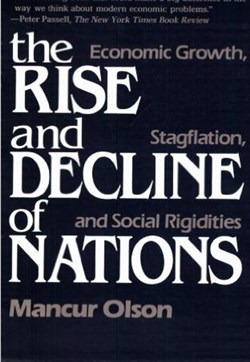Bilin Neyaptı, Associate Professor, Department of Economics
BY MELİS ERDEM (ARCH/II)
Well, the question of what book has influenced me most is a difficult one for someone my age to answer. I grew up in a house where there were several thousand books. So, many of them must have influenced who I am today. But perhaps I can talk about one of the most recent books that I’ve read, as well as one that has affected my career.
 The book that has affected my career the most was written by my PhD advisor, Mancur Olson. Its title is “The Rise and Decline of Nations,” and its main thesis is that the selfish interests of narrow interest groups lead to a lot of inefficiency in the economy and this is actually the main reason why countries are unable to develop. There are many examples given in the book from around the world concerning the formation and evolution of narrow interests, which explain the types of development patterns found around the world. So, it’s a fascinating work. The reason that I think it was very influential in my career is because later on I focused on the issue of underdevelopment and its causes. And in fact a lot of my work has referred to a similar kind of explanation for underdevelopment.
The book that has affected my career the most was written by my PhD advisor, Mancur Olson. Its title is “The Rise and Decline of Nations,” and its main thesis is that the selfish interests of narrow interest groups lead to a lot of inefficiency in the economy and this is actually the main reason why countries are unable to develop. There are many examples given in the book from around the world concerning the formation and evolution of narrow interests, which explain the types of development patterns found around the world. So, it’s a fascinating work. The reason that I think it was very influential in my career is because later on I focused on the issue of underdevelopment and its causes. And in fact a lot of my work has referred to a similar kind of explanation for underdevelopment.
Coming to the second book, this one is a novel by Yaşar Kemal, “Filler Sultanı ile Kırmızı Sakallı Topal Karınca.” This is one of Kemal’s lesser-known works, but I’ve been recommending it to everyone ever since I read it. I think any economics, political science or philosophy student would be very interested in reading it, because it’s quite an intense book. It’s a fable—a lot of people liken it to “Animal Farm” by George Orwell, but it’s much deeper and goes beyond it.
In the novel, the elephants start a fight against the ants, and the ants become like slaves who satisfy the needs and wants of the elephants, doing tasks such as collecting grain for their consumption and even starving themselves because the elephants might destroy them otherwise. They build diamond palaces for the elephants, and this eventually causes the end of the elephants. The ants find that the only way out of their slavery is to carve away the soil beneath the castle. And so the heavy diamond castle collapses on the elephants.
elephants.
This is sort of a dialectical story. The reason it’s so interesting to me is because it summarizes the state of the world now: it’s just like the 1 percent of the population getting half of the world’s income and the 99 percent getting the rest. So, in a way, the 99 percent are working in the service of the 1 percent. In other words, this fable is like a real story, where the elephants can be said to represent fierce capitalism.
Therefore, you see, we can combine the two books I’ve mentioned, with the narrow interests that I talked about first being analogous to the elephants’ insatiable needs and wants; in the end, they will lead to a sort of crisis, which will in turn probably lead to change in socio-economic systems that cause unfairness and inequality.
